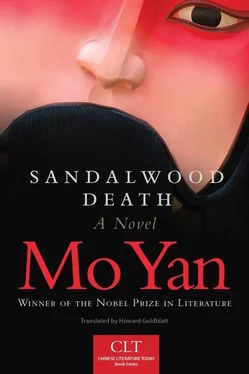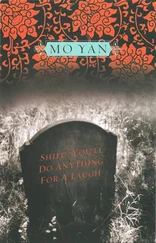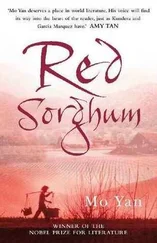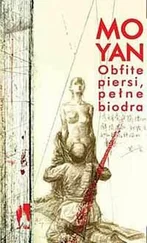—Maoqiang Sandalwood Death.
A soliloquy
A crowd of people in vivid dress, faces painted all the colors of the rainbow, some tall and some short, emerged from Rouge Lane, southwest of the county yamen. The leader had powdered his face the white of a handsome young actor and painted his lips the bright red of a ghost of someone hanged. His upper body was covered in a red satin unlined robe (almost certainly appropriated from a corpse) that fell below his knees and revealed a pair of greasy black legs and bare feet. A live monkey was perched on his shoulder, enjoying its bumpy ride as the man hopped along, brass gong in hand. He was none other than Hou Xiaoqi of the beggar troupe. After three beats of the gong— clang clang clang —he sang a line from a Maoqiang opera:
“Beggars celebrate a festival in their own wretched way, ah~~”
He had the ideal voice for opera, with a unique lingering quality that made his listeners wonder whether they should laugh or cry. After he’d sung his last note, the other beggars responded with cat cries:
“Meow~~meow~~meow~~”
Then a few of the younger beggars imitated a cat fiddle as a prelude to a new aria:
“Li-ge-long-ge li-ge-long-ge long~~”
When they had finished the prelude, my throat began to itch, but this was not a day for me to sing. On the other hand, it certainly was for Hou Xiaoqi. Melancholy affects people everywhere, rulers and subjects, at least to some degree. Except for beggars. Hou Xiaoqi began anew:
“With boots on my head and a cap on my feet, come hear my topsy-turvy song~~meow~~meow~~Mother goes into mourning when her son gets married, a Magistrate travels afoot while in a chair we are carried~~meow~~meow~~a rat chases a cat that is harried, snow falls in midsummer and a city is buried~~meow~~meow~~”
A thought broke through the fog in my head that tomorrow was the fifteenth day of the eighth month, which meant that today, the fourteenth, was Beggars’ Day, celebrated throughout Gaomi County. On this day each year, beggars from all over the county parade three times past the official yamen. They sing Maoqiang opera the first time and perform acrobatics the next. On their third pass, they untie sacks from around their waists and, first on the south side of the avenue, then on the north, they approach women, young and old, standing in their doorways, to fill their sacks from proffered gourds and bowls, some with various grains, others with uncooked rice, and others still with rice noodles. When they come to our door each year, I dump greasy brass coins from a bamboo tube into a chipped ladle in the hands of a crafty little beggar who opens his throat to let loose a cry of gratitude: “Thank you, Ganniang, for that tip!” All those greedy eyes then turn to me, and I know what they want! But I cock my head, curl my lip, and flash a smile, letting my eyes sweep the crowd, getting a rise out of all those monkeys, which turn somersaults to the screaming delight of the children behind them and the onlookers lining the street. My husband, Xiaojia, takes greater pleasure in this festive day than the beggars themselves. He gets up bright and early and, without stopping to slaughter pigs or butcher dogs, falls in behind the parading beggars, dancing for joy, singing along with them one minute and making cat cries the next. Lacking the voice to sing Maoqiang, Xiaojia has a talent for cat cries, sounding like a tomcat one minute and a tabby the next, then a tomcat calling out to a tabby and a tabby calling out to her kittens, and finally lost kittens crying for their mother, this last call bringing tears to the eyes of anyone within earshot, like an orphan who longs for her mother.
Niang! How tragic you died so young, leaving your daughter to suffer torment alone. But your early passing spared you from the paralyzing anxiety and crippling fear for which my dieh must atone … I watched the contingent of beggars swagger past the imposing array of soldiers. Hou Xiaoqi’s voice does not crack; the beggars’ cat cries never waver . On the fourteenth day of the eighth month, beggars rule the roost in Gaomi County, and even my gandieh’s loyalists must quietly make way for their procession. Beggars carry a rattan chair over their heads with Zhu Ba, the reprobate. He has worn a tall red-paper hat and a yellow satin dragon robe of late . For a pauper, a commoner, or a minor bureaucrat to dress like that would have been a crime, one that would likely cost them their life. But Zhu Ba had license to overstep all authority, for the beggars had created their own kingdom, and freely did as they pleased. But this year there was a new twist: they escorted an empty chair—Zhu Ba was nowhere to be seen. Where had he gone? Why is he not sitting imperiously in his Dragon Chair? Glory as great as an official in the top-tier range. Meiniang hears her heart skip a beat. The beggars this year, I think, are acting strange.
I, Meiniang, born and raised in Gaomi, came to the county town as a bride in my late teens. Before that, I sang Maoqiang opera in my father’s troupe, performing in all nine villages and eight hamlets. I’d come often to the county town, which seemed like a big place to me, and I have a vague recollection of my father teaching opera to the town’s beggars. I was still young then and wore my hair like a boy, which is what people thought I was. Actors and beggars, my father said, are alike. Beggars are no different than actors; actors are the same as beggars. Which is why beggars and I came together naturally. And why I saw nothing unusual in a beggars’ parade. But those German soldiers from Qingdao and the Imperial Guards from Jinan had never seen such a sight. They slapped the butts of their rifles, ready to confront the enemy, and then stood wide-eyed—some eyes round, some slanted—gawking at the bizarre, raucous assemblage of approaching humanity. But when the procession drew near, they loosened their grip on their weapons as odd, scrunched-up expressions crept onto their faces. Those of the Imperial Guards weren’t nearly as comical as those on the faces of the German soldiers, since they at least were familiar with the tunes emerging from Hou Xiaoqi’s mouth. To the Germans it was gibberish, all but the obvious cat cries mixed with lyrics. I knew they were wondering why all those people were yowling like cats. And while their attention was riveted on the parade of beggars, they forgot about the one person who wanted to storm the yamen gate—me. My brain was engaged. The moment had arrived, and I’d have been a fool to let it pass. Turn the gourd upside down, and the oil spills out. When opportunity falls into your lap, do not stand up. For me it was trying to catch fish in muddy water, frying beans in a hot skillet, adding salt to boiling oil. The chaos on the street was Meiniang’s invitation to dash through the gate. Meiniang would crash the yamen gate to free her dieh from his prison cell. Though she be smashed like an egg against steel, her tale as a martyred daughter the people would tell. I waited for the chance, my mind made up. Hou Xiaoqi’s gong rang out louder and louder; his topsy-turvy tune was getting increasingly dreary, and the cat-criers were holding out just fine, filling the air with their exaggerated yowls as they made faces at the soldiers and guards. When the procession got to where I was standing, as if on a signal, the beggars pulled cat skins out from under their clothes; large head-to-tail skins were draped over their shoulders, and smaller ones went on their heads. This unexpected, stupefying turn of events stunned the guards. I’d never get a better chance, so I stepped to the side and slipped between the German soldiers and the Imperial Guards, heading for the yamen gate. Momentarily dumbstruck, they quickly came to their senses and blocked my way with bayonets. But I would not be denied—the worst they could do was kill me—I was going into that yamen, bayonets or not. But at that critical moment, two powerful beggars pulled out of the procession, grabbed me by the arms, and dragged me back. I made a show of struggling to break free and run toward the bayonets, but a half-hearted one. Though not afraid to die, I was in no rush to do so now. I wouldn’t be able to close my eyes in death without seeing Qian Ding one last time. Truth is, I was like a poor donkey trying to walk down a flight of steps. With eerie shouts, the beggars surrounded me, and before I knew it, I was sitting in the rattan chair tied to a pair of bamboo poles. I fought to get down, but four strapping, grunting beggars hoisted the poles onto their shoulders, and I was up in the air, rising and falling with the motion of the chair beneath me. I felt a sudden sadness; tears filled my eyes. But that made the beggars happier, as their leader, Hou Xiaoqi, beat a frantic tattoo on his gong and raised his voice higher than ever:
Читать дальше












